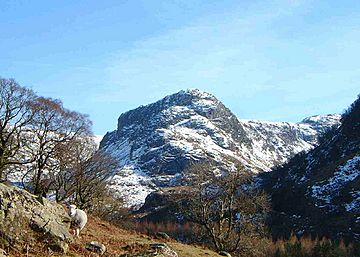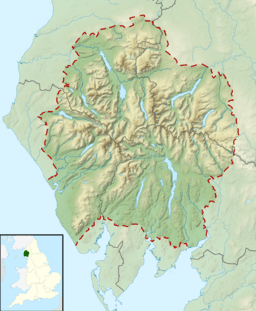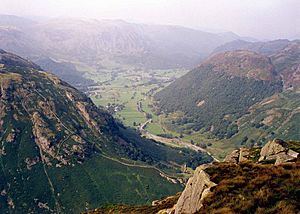Eagle Crag facts for kids
Quick facts for kids Eagle Crag |
|
|---|---|

Eagle Crag seen from the Stonethwaite valley
|
|
| Highest point | |
| Elevation | c. 521 m (1,709 ft) |
| Prominence | c. 25 m |
| Parent peak | Sergeant's Crag |
| Listing | Wainwright |
| Geography | |
| Location | Cumbria, England |
| Parent range | Lake District, Central Fells |
| OS grid | NY275121 |
| Topo map | OS Explorer OL4 |
Eagle Crag is a cool fell (which is a type of mountain or hill) located in the amazing Lake District in Cumbria, England. It stands proudly near the small village of Stonethwaite. This is where the Langstrath and Greenup valleys meet. Eagle Crag has impressive rock walls that look down on Stonethwaite. This makes it a really striking sight from the village. Even though it looks tough, regular hikers can climb it by finding a path between the rocky parts.
Contents
Exploring Eagle Crag's Height and Shape
Eagle Crag's exact height isn't officially set by the Ordnance Survey. Different sources give its height as being between 520 and 525 meters. For example, Bill Birkett says it's 521 meters (1,709 feet) tall in his book, Complete Lakeland Fells.
A famous fell-walker named Alfred Wainwright wrote about Eagle Crag in 1958. He estimated its height at about 503 meters (1,650 feet). He thought Eagle Crag was very special, saying it was "so splendidly situated, so nobly proportioned and of so arresting appearance that it is a far worthier object than the parent fell (High Raise) rising behind." This means he found it more impressive than the bigger mountain behind it!
Eagle Crag is part of the rocky end of a ridge that comes from a taller fell called High Raise. It looks super dramatic when you see it from the Stonethwaite valley. It's connected to Sergeant's Crag, which is less than a kilometer away to the south. A dry stone wall runs along the ridge between them. This wall helps walkers find their way between the two peaks.
What Eagle Crag is Made Of
The top part of Eagle Crag is made from a type of rock called rhyolitic tuff. This rock formed from volcanic ash and small rock pieces that were welded together. You can also find patches of rhyolite rock lower down the slopes.
Reaching the Summit of Eagle Crag
At the very top of Eagle Crag, you'll find a small cairn (a pile of stones). It's balanced on a tilted rock slab. Just a few yards away to the west and north are some rocky cliffs. A corner in the dry stone wall is only a couple of minutes' walk south from the summit.
The best views from the top are towards the north and west. You can see Borrowdale and the Langstrath valley really well. You can also spot the fells (hills) all around them.
How to Climb Eagle Crag
Most people start their climb to Eagle Crag from the village of Stonethwaite. You can even combine climbing Eagle Crag with visiting taller fells like High Raise and Ullscarf. You can also visit nearby Sergeant’s Crag.
When you look at Eagle Crag from Stonethwaite valley, it might seem impossible to climb directly. It looks like there are vertical rock walls blocking the way. But don't worry! You can find a path through these rocky sections to reach the summit directly. However, going down this same path is not a good idea. This is because the dangerous cliffs can't be seen from above when you're descending.
An easier way to climb is to follow the bridleway (a path for walkers and horses) up Greenup Gill. This path is well-marked and is even part of Wainwright’s famous Coast to Coast Walk. To reach Eagle Crag, you leave this bridleway when you are about 330 meters high. Then, you turn back on yourself and climb up steep grassy slopes to the summit.
Rock Climbing on Eagle Crag
The rocky cliffs directly below the summit are popular with rock climbers. The climbs here are quite challenging. They are graded in the extreme and very severe categories. This means they are only for experienced climbers!
 | Shirley Ann Jackson |
 | Garett Morgan |
 | J. Ernest Wilkins Jr. |
 | Elijah McCoy |



